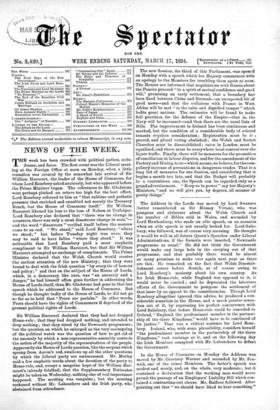NEWS OF THE WEEK.
THE week has been crowded with political pathos, melo- drama, and farce. The first event was the Liberal meet- ing at the Foreign Office at noon on Monday, when a little sensation was created by the somewhat late arrival of Sir William Harcourt, the leader of the House of Commons, for whom Lord Rosebery asked anxiously, but who appeared before the Prime Minister began. The references to Mr. Gladstone were perhaps pitched an octave too high for the best effect. Lord Rosebery referred to him as "that sublime and pathetic presence that enriched and ennobled not merely the Treasury Bench, but the House of Commons itself." Sir William Harcourt likened his loss to the loss of Nelson at Trafalgar. Lord Rosebery also declared that " there was no change in measures, there was only a most disastrous change in men,"— and the word "disastrous " verified itself before the morrow came to an end. " We stand," said Lord Rosebery, " where we stood;" but before Tuesday night was over, they may be said to have fallen "where they stood." It was noticeable that Lord Rosebery paid a most emphatic compliment to Sir William Harcourt, but that Sir William Harcourt attempted no exchange of compliments. The Prime Minister declared that the Welsh Church would receive -the earliest attention of the new Ministry ; that they were bound to deal with the Irish question " by every tie of honour and policy;" and that on the subject of the House of Lords, which, in a democracy like ours, was "an anomaly and a .clanger," he had himself often gone further in addressing the House of Lords itself, than Mr. Gladstone had gone in that last speech which he addressed to the House of Commons. Bat though he thought badly of the House of Lords, he did not go -so far as to hold that " Peers are pariahs." In other words, Peers should have the rights of Commoners if deprived of the present political rights of Lords.


































